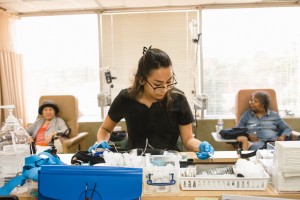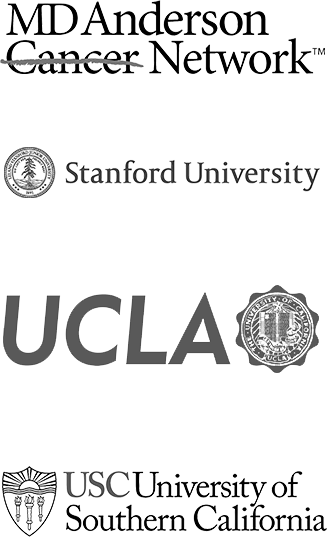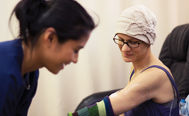FAQs
Questions about Cancer
We would like to help you to understand your condition and manage your care by providing you with the following useful information. Use the resources on this page to help you actively participate in your cancer care. This site includes some forms to help you to track phone numbers, treatment history, side-effects, and laboratory results (such as your complete blood count, “CBC”). Keep the information handy to reference at home and take to your doctor visits and other medical appointments.

How long will I have to stay in Los Angeles for my first visit?
To allow sufficient time to reach the best possible recommendation for your care, you should come prepared to stay for at least one week. This gives the physicians enough time for a complete review of all your medical reports and information, including the information that you bring with you, and any additional tests that may be ordered during your stay.
The treatment option you choose also affects how long you will be here, and your physician will closely monitor your care. It may be necessary for you to stay in the Los Angeles area for one to two months.
 What is nutrition therapy?
What is nutrition therapy?
Many cancer patients can experience gastrointestinal problems. Nutrition therapy is a way to restore digestive health, prevent malnutrition, and satisfy dietary requirements during treatment. By keeping strong and nourished through proper nutrition, you will remain healthy for your cancer treatment.
How promptly can an appointment be scheduled?
Getting a cancer diagnosis from your doctor is life-changing, and we recognize the importance of your getting an appointment as soon as possible. Accommodating new and exiting patients is a priority, and we will schedule an appointment for you at your earliest convenience.
How long does it take for my test results?
We have close relationships with our medical associates, and from these connections, we are able to schedule screening exams and receive test results promptly. Our turnaround time is typically same day within four hours.
Is exercise recommended during treatment?
Yes, exercise has been shown to be safe for people going through active cancer treatments, and in fact can be one of the best ways to relieve some of the symptoms associated with your cancer or cancer treatment. Our physical therapist will pay close attention to your medical status to be certain to prescribe an exercise program that is safe for you throughout the course of your cancer journey.
Cancer Center physicians thoroughly research chemotherapy treatment options for their patients to find the right balance of therapy effectiveness while minimizing side effects for each patient. As a result of these efforts, patients can maintain a productive lifestyle and integrate exercise into their lives while in treatment.
Is it possible to continue working while in treatment?
Yes, many of our patients remain in their jobs and maintain a productive lifestyle during treatment. Our physicians are dedicated to finding the most effective balance of drug therapy to fight the cancer, yet minimally impact our patients’ daily routines, including work.
Is it recommended to tell my doctor if I have side effects from treatment?
Yes, telling your doctor about side effects is essential to getting good care and living as fully as possible. Untreated side effects can drain you physically and emotionally and detract from your healing. Your response to therapy is unique, and your doctors rely upon your telling them about your side effects.
How is cancer pain managed?
For a tumor that causes pain, removing or destroying all or part of the tumor with chemotherapy or radiation can help. Pain control often starts with medicine. Many drugs are used to treat pain which the patient and their doctor determine and alter as pain level changes.
Why is screening helpful to early detection?
Screening helps find health problems before symptoms appear. Examples of screening tests include mammograms to find breast cancer and colonoscopy to find colon cancer. Early detection catches cancer when it’s in a early, more treatable stage.

What is alternative medicine?
A group of different medical and health care systems, practices, and products that are not typically part of conventional medicine and can include chiropractic, massage therapy, Chinese or Ayurvedic herbal medicine, or yoga among others.
How do staging and grading cancer affect treatment?
Knowing the stage and grade of a person’s cancer helps doctors know what treatment to use and determine outcome. Staging reveals how far cancer has spread and grading helps predict how fast the cancer will grow and spread.
Cancer is typically staged as:
Stage 0: Cancer hasn’t spread.
Stages I, II, and III: Cancer has grown or has spread into nearby tissues and perhaps lymph nodes. The higher the stage, the farther the cancer has spread.
Stage IV: Cancer has spread beyond the lymph nodes into other parts of the body (metastasized).
How does a positive attitude affect cancer treatment?
The brain produces chemicals that affect how well our body fights disease. Through the mind-body connection, positive emotions and laughter send signals to the brain which then produces chemicals that:
Increase blood circulation
Boost the immune system and help to fight off infection
Relax muscles, restores energy, and lowers stress
Improve mood and better manage pain and stress
How am I managing my progress?
It is very important to document your side effects, including the date, time and frequency, and severity (mild or strong). You should also monitor your blood count changes to ensure treatment remains on schedule. Your “Health Condition and Treatment History” form will help you manage your progress.
How does chemotherapy work?
Chemotherapy is designed to kill cancer cells. Depending on which drug is used, chemotherapy can be administered through a vein, injected into a body cavity, or delivered orally in the form of a pill.
Chemotherapy works by destroying cancer cells but unfortunately, it cannot tell the difference between a cancer cell and healthy cells. So chemotherapy eliminates not only the fast-growing cancer cells but also other fast-growing cells in your body including hair and blood cells.
Some cancer cells grow slowly while others grow rapidly. Therefore, each chemotherapy drug is designed to target the growth patterns of a specific type of cancer cell. As a result, each drug works differently and is effective at specific times in a cancer cell’s life cycle. Your doctor determines the chemotherapy drug that is right for you.
Discussing the effectiveness of cancer treatment
You are encouraged to understand the goals and risks of each treatment option so that in working with your doctor, you decide as a team on the best treatment for you. Working together helps you to consider potential benefits against treatment risks and balance them during your treatment.
Depending on your personal circumstances, cancer treatment risks may include absence from family and friends, uncomfortable side-effects or long-term complications. Cancer treatment can be inconvenient, prolonged, or unavailable close to home.
Once you and your doctor have decided on a treatment plan, talk with your doctor about everything that you can do to ensure you receive the full dose of your cancer treatment as scheduled. You can make note of subjects to discuss and questions to ask your doctor with the by using “My Health Condition and Treatment History” form.
Importance of full dose on schedule
 The goal is to make your chemotherapy as effective, timely, and problem-free as possible. Your doctor will develop a treatment plan scientifically designed for you and based on your type of cancer, its stage of advancement, and your overall health. Generally, treatments are given daily, weekly, or monthly, and your doctor will work with you to determine the most effective treatment schedule.
The goal is to make your chemotherapy as effective, timely, and problem-free as possible. Your doctor will develop a treatment plan scientifically designed for you and based on your type of cancer, its stage of advancement, and your overall health. Generally, treatments are given daily, weekly, or monthly, and your doctor will work with you to determine the most effective treatment schedule.
It also can require your doctor to change your dose or rearrange your chemotherapy schedule. These changes to a treatment plan could ultimately make your cancer treatment less effective than it should be or even prolong treatment duration.
To get the most from chemotherapy, it’s important to stick to a schedule of treatment and dose that you and your doctor initially set up.
Next, read about our blog.



